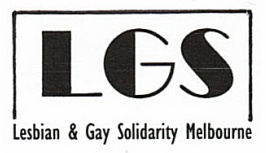 SECTION
SECTION
| INTER |
|
SECTION |

In 1997, Inter~Section, a group that works to ensure sexual minority access to appropriate community services, met with social planners to discuss the inability of their procedures to identify the needs of the queer population. The group was critical of the fact that though council planners looked at the different needs of the population like aged and youth, and disadvantaged sections like Aboriginal and disabled, these processes failed to reveal sexual minority needs. As a consequence most councils had safety committees that ignored homophobic violence, libraries that were poorly resourced for these citizens and local community services that had nothing to offer them.
In March 1998, the Department of Urban Affairs and Local Government issued a draft planning manual for NSW councils. Inter~Section alerted the Anti-Discrimination Board and peak queer organisations to request that gays, lesbians, bisexuals and transgender people be included as a special needs population group. They also sent their proposed social planning guidelines for inclusion in the manual. These guidelines were accepted in their entirety.
Christine Bird, who wrote the new planning guidelines for sexual minorities, said "Council staff are now advised to assess whether their councils indirectly discriminate by ignoring barriers to access. Do the community services they fund provide services to this community? Are council-owned facilities being used by them? It's not enough to say they don't actively discriminate if no services are available for our communities' needs."
Since its inception Inter~Section had struggled to get councils to voluntarily consider queer needs. Mannie De Saxe and Kendall Lovett had written to a number of Councils requesting information provided to sexual minorities and details of any relevant consultations or planning processes. Those councils that bothered to reply proved the case for Inter~Section that there was little local government interest.
"Thanks to Inter~Section's action, covert discriminatory attitudes to lesbians and gays have at last been recognised in local government guidelines," say De Saxe and Lovett, "but unlike the other disadvantaged groups, planning for sexual minorities is not yet mandatory."
Inter~Section is now working on finalising a social planning kit and in building a case on the anomalies that exclude sexual minorities from being seen by government departments as a social justice issue and a disadvantaged community.
Please feel free to call one of the Inter~Section contact people if you would like more information, including a copy of the full Tolerance Report. You can call Christine Bird, ( 02 9525 3790) or Roy Bishop, ( 02 9318 0438).

